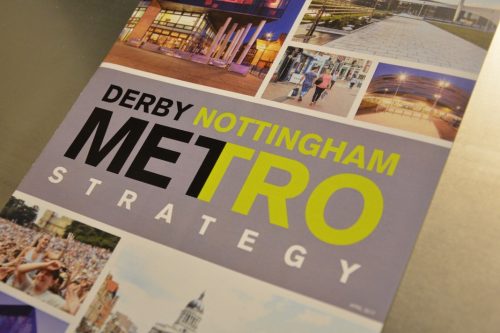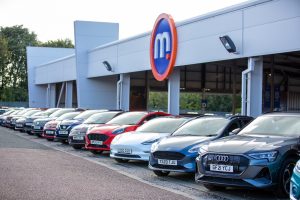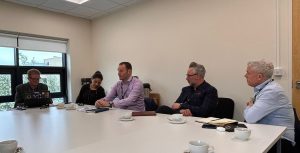Business leaders back £11bn Derby-Nottingham Metro plans

East Midlands business leaders have given their backing to plans for organisations across the Derby and Nottingham area to work more closely together to improve opportunities and quality of life for local people.
A Derby Nottingham Metro Summit, which took place at the University of Derby on Wednesday (17 January), was attended by over 100 representatives from local businesses, including Toyota and East Midlands Airport; the education sector and local councils.
The Summit was an opportunity to discuss in more detail the key findings of a major independent report published by leading national consultancy Metro-Dynamics late last year.
The report highlighted how closer joint working between local authorities and businesses across the wider Derby and Nottingham metro area could provide an £11 billion boost to the local economy by 2030.
Keynote speakers at the Summit included City Council leaders councillors Jon Collins from Nottingham and Ranjit Banwait from Derby; professor Judith Lamie, pro-vice chancellor External Affairs at the University of Derby; and David Williams, chair of law firm Geldards and chair of the Metro Strategic Advisory Group, which has members from the Derby and Nottingham business community.
The two City Councils have already begun to work closely together as part of the Derby Nottingham Metro Strategy on joint access for residents of both cities to services such leisure centres and libraries services.
Leader of Derby City Council, councillor Ranjit Banwait, said: “Strong economies are built on strong cities, and both Derby and Nottingham have a solid base. The evidence of Metro Dynamics also clearly demonstrates a strong connection. Over 40,000 people regularly commute between Derby and Nottingham and we’re closer in distance than the Olympic Stadium and Wembley. Many of the families I talk to in Derby have children living or studying Nottingham and the opposite is equally true. As Civic Leaders we firmly believe we’ve more to gain from cooperation than competition if we want to unlock the economic potential of our region and keep our local talent.
“Derby is home to world class advanced manufacturing which accounts for 30% of its GVA, making it the strongest manufacturing city in the UK. Nottingham is a Core City with regional city strengths in finance, business services and public administration, as well as growing specialisms in biotech, data processing, digital and creative sectors.
“I believe we have a greater chance to maximise the economic growth in and around our cities if we challenge our differences and champion our whole region; bringing prosperity to the citizens, employees and visitors way beyond our urban boundaries.”
Nottingham City Council leader, Councillor Jon Collins, said: “Scale is important when it comes to establishing a national presence and international reputation.
“To illustrate this, Ningbo – Nottingham’s twin city in China – has a population of 3.5 million and it’s not even among the largest 30 cities in China. Nottingham and Derby as individual cities struggle to match this on a global scale but together, with an urban population of over one million, we are one of the 50 largest metropolitan areas in Europe.
“There was a broad consensus among people attending the Summit about the benefits of a Metro approach. It’s important that we now agree the priorities for taking the Metro strategy forward.
“Building a consensus around HS2, the development of East Midlands Airport development and Midland Mainline electrification will be vital. We also need to broaden and deepen the Metro Strategy in areas such as housing, planning, energy and transport.”
David Williams confirmed at the Summit that a Metro Growth Board is to be established of business leaders alongside leaders of local authorities who want to be part of a ‘coalition of the willing’ to take the Metro Strategy forward.
He said: “For me it makes perfect sense for the two cities and the Metro area to come together. How effectively we work across organisations, sectors and boundaries to get the most for local residents, employees and visitors will be a decisive factor in maintaining and growing our local prosperity and pride.”
“The Metro area has businesses and services which complement one another, with a high level of local residents who work in local companies. It is clear we have much more to gain in common than in competition.
“The Metro Dynamics report makes a strong case for formal collaboration with significant potential for growing the economy for the benefit of local people but also presents us with challenges across administrative boundaries.
“Now is time to relook at the Metro Strategy and our aims to develop the global reputation of the Metro area that when combined form one of the UK’s most important urban areas as well as being one of the top 50 population centres in Europe.”









